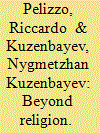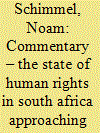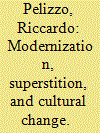|
|
|
Sort Order |
|
|
|
Items / Page
|
|
|
|
|
|
|
| Srl | Item |
| 1 |
ID:
193269


|
|
|
|
|
| Summary/Abstract |
By equating the traditional mindset with traditional beliefs (in magic, ritual, superstitions, etc.), several studies have consistently shown that such beliefs significantly influence people's political behavior and preferences. While these studies have highlighted the political consequences of a traditional mindset in several countries from the Global South, they nevertheless have little to say as to whether holding superstitious beliefs (e.g., believing in fortune tellers, horoscopes, or lucky charms) has certain political implications for countries in the Global North. In this article, we explore whether the traditional mindset has political consequences even in an industrially advanced Germany. We present an analysis of data from the German General Social Survey (GESIS 2019) showing that superstitious voters have less trust in the political system, are more inclined to think that Hitler would be remembered as a good stateman if he had not perpetrated the Holocaust, that the Nazi regime also had a good side, and that the Jews are different and, in any case, have too much influence. Hence, dissemination of superstitious beliefs could make right-wing populists more electorally appealing and successful than they once were. We believe our findings to be of some importance as they show that if the proliferation of superstitious beliefs continues unchecked, they may transform our political systems in ways that policy makers and democratic forces should strive to avoid.
|
|
|
|
|
|
|
|
|
|
|
|
|
|
|
|
| 2 |
ID:
193271


|
|
|
|
|
| Summary/Abstract |
Ironic as it may seem, one of the major victims of America's diplomatic retreat from Pakistan has been India. China has filled the void of U.S. disengagement, solidifying its grip on Pakistan and locking India in a two-front vise that it cannot cope with on its own. India has no choice but to reach out for alliances with liberal nations it shunned in its Non-Aligned days. This radical policy shift is capped, however, by the ideological constraints of Modi's BJPism. That is the main reason why India has refused to abort its military and economic ties with Russia. A similar anti-liberalism led Imran Khan, the ex-prime minister of Pakistan, to seek an anti-Western accord with Russia. Conversely, Pakistan's current leadership is trying hard to repair its U.S. relations. Following the lead of Secretary of State Antony Blinken, this extended commentary favors robust U.S. engagement with all of South Asia but qualifies that case by stressing that the wrong kind of engagement would end up serving the cause of Sino-authoritarianism. What is needed is moral realism, which avoids the ethical blight of both Kissingeresque realism and globalist irrealism. Pakistan is ripe for this post-globalist realism because it affords no clean and neat “right” choices yet is far too important to abandon. Such cases compel us to search for lesser evils: the best available bad choices we can locate.
|
|
|
|
|
|
|
|
|
|
|
|
|
|
|
|
| 3 |
ID:
193270


|
|
|
|
|
| Summary/Abstract |
As South Africa approaches 30 years of democracy, it is important to pause to reflect and analyze the trajectory of human rights since the fall of the apartheid regime and the advent of multiracial democracy. Although there was a large global movement against apartheid, this movement's vigilance for human rights in South Africa quickly declined and dissolved with the advent of South African democracy. There is little critical engagement with South Africa's contemporary human rights record and policies by global human rights activists, nongovernmental organizations, and civil society and still less active campaigning in defense of the human rights of South Africans, especially South Africa's most vulnerable and disadvantaged black majority. The energy that was summoned to protest apartheid and to boycott it never returned since the advent of democracy. This commentary explores the current state of human rights in South Africa, their prospects, and challenges to their respect, protection, and fulfillment.
|
|
|
|
|
|
|
|
|
|
|
|
|
|
|
|
| 4 |
ID:
193264


|
|
|
|
|
| Summary/Abstract |
This World Affairs 2023 special issue contains six contributions, including this one, exploring some of the key political consequences of traditional beliefs such as magic and superstition in the developing societies of the Global South as well as in certain industrially advanced societies of the Global North. To show why traditional beliefs matter, we provide an explanation in this introduction for why traditional beliefs exist in developing countries, why they survive in developed countries, and why they may become more popular over time. By utilizing a simple game theoretic approach, we explain why rational people can sometimes increase their payoffs by subscribing to a superstition while superstitious people never gain by switching to rationality. In fact, the superstition—which has no causal connection with the natural course of events—may even yield better results, not only for the individual but also for the group. This is the reason why, in the framework of evolutionary stable equilibrium, superstitious people can demographically dominate an entire population over time. In addition to explaining the existence and the persistence (or the popularity) of traditional beliefs, we highlight the key findings presented in the articles included in this special issue. All of them underline a cardinal point: traditional beliefs matter. They shape electoral behavior, they shape attitudes toward democratic governance, and they influence voters’ assessment of political figures and historical events. Precisely because traditional beliefs have such extensive implications for a country's political life, we believe that in the future scholars will have to pay greater attention to such beliefs to have a better understanding of political phenomena and trends.
|
|
|
|
|
|
|
|
|
|
|
|
|
|
|
|
| 5 |
ID:
193265


|
|
|
|
|
| Summary/Abstract |
By exploring the relationship between socioeconomic development, secularism, and the pervasiveness of traditional beliefs, this article shows that while some traditional practices and beliefs, such as making use of traditional healers, are negatively and significantly related to several development indicators, there is little to no detectable (statistical) relationship between other traditional beliefs and practices, such as believing in and seeing a jinn, and development. The evidence presented in the article sustains the claim, advanced at the turn of the millennium by Inglehart and Baker, that the impact of socioeconomic development on values, attitudes, and cultural change is complex and non-linear.
|
|
|
|
|
|
|
|
|
|
|
|
|
|
|
|
| 6 |
ID:
193267


|
|
|
|
|
| Summary/Abstract |
The party system literature has generally paid little attention to whether traditional beliefs have any impact on voters’ electoral behavior and the stability of party systems. The purpose of the present study shows that the stability of party systems and the pervasiveness of traditional beliefs go hand-in-hand. This article is expected to advance the scholarly understanding of the political consequences of traditional beliefs by showing that voters who hold traditional beliefs or engage in traditional practices are not simply less likely to have pro-democratic attitudes or have a greater appreciation of dictatorial rule, but also more likely to vote for ruling parties in elections. The evidence presented in the article sustains a basic claim; namely, that the pervasiveness of traditional beliefs in Togolese society should be regarded as one of the determinants of the party system's stability.
|
|
|
|
|
|
|
|
|
|
|
|
|
|
|
|
| 7 |
ID:
193266


|
|
|
|
|
| Summary/Abstract |
While several studies on the issue have shown that traditional beliefs affect people's political behavior and preferences, very little attention has been paid to how traditional beliefs influence electoral behavior. The only study that has attempted to link traditional beliefs and electoral behavior has done so by analyzing the case of Togo where the party system has been traditionally fairly stable and unfragmented. The case of Indonesia, on the other hand, has undergone significant changes since the end of the Orde Baru, and what was once a fairly unfragmented party system now displays high levels of fragmentation. Hence, it is particularly interesting to explore how the presence/diffusion of traditional beliefs shapes the voters’ choices in a changing, increasingly fragmented, democratizing political system. Moreover, in reviewing the literature on Indonesian elections, we find that, first, the study of electoral behavior in Indonesia has made little effort to employ existing theoretical frameworks; second, quantitative studies are scarce; and third, there are practically no micro-level quantitative studies on electoral behavior. In this article, we assess whether and to what extent the electoral choice of a voter is affected by whether and to what extent they hold on to traditional beliefs by performing statistical analyses of original survey data. We find that voters with a traditional mindset are more likely to vote for the secular parties in the ruling coalition than voters who do not hold traditional beliefs.
|
|
|
|
|
|
|
|
|
|
|
|
|
|
|
|
| 8 |
ID:
193268


|
|
|
|
|
| Summary/Abstract |
The new modernization theory has suggested that the pervasiveness of traditional values has a clear impact on the quality of democratic governance. In this contribution to this special issue on the political consequences of traditional beliefs, we explore whether and to what extent the pervasiveness of traditional values and beliefs has a detectable impact on authoritarian attitudes. Specifically, we analyze the relationship between the support for a “strongman” and the acceptability of traditional practices for Muslim respondents from 27 jurisdictions. The results suggest that those who believe that traditional practices, such as the use of sorcery, appealing to jinn, and to the souls of ancestors, are acceptable under Islam are more likely to prefer a strongman to democracy. Notably, we found that respondents’ religiosity does not significantly affect their support for a strongman, raising questions about how accurately traditionality has been measured so far.
|
|
|
|
|
|
|
|
|
|
|
|
|
|
|
|
|
|
|
|
|